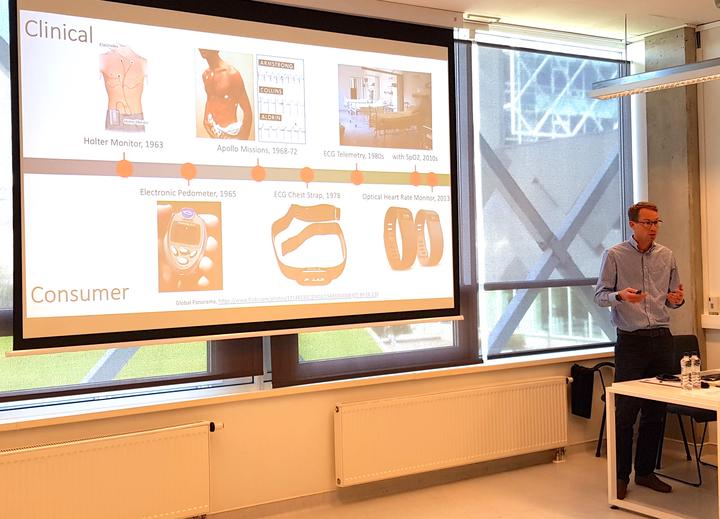Short-term scientific mission
A collaborative visit to Kaunas Institute of Technology, aiming to harmonise photoplethysmography-based techniques for the assessment of vascular ageing
 Source: P. Charlton (see presentation for acknowledgments)
Source: P. Charlton (see presentation for acknowledgments)
Dr Peter Charlton spent 5 days at Kaunas University of Technology (KTU), hosted by Prof Vaidotas Marozas, Director of the Institute of Biomedical Engineering. Vaidotas and Peter are members of VascAgeNet, a network for research into vascular ageing. They’ve previously collaborated on several projects including a VascAgeNet review of techniques to assess vascular age from the photoplethysmogram (the PPG - the pulse wave signal measured by smartwatches and activity trackers). During this short-term scientific mission, Vaidotas and Peter worked with colleagues at KTU towards harmonising photoplethysmography-based techniques for the assessment of vascular ageing.
First, Peter and colleagues worked on developing PPG signal processing techniques for the assessment of vascular ageing. Specific tasks included: designing approaches to estimate blood pressure from the PPG pulse wave signal; developing PPG signal quality assessment tools which could help ensure that vascular ageing assessments performed in daily life are reliable; and investigating how well PPG signal processing algorithms perform with different types of sensors. This involved sharing knowledge, data, and signal processing algorithms.
Second, Peter and colleagues discussed the designs of two ongoing clinical studies at KTU and at the University of Cambridge. They identified ways to harmonise the methods used in the two studies so that they provide similar datasets. It is hoped that this will enable the two groups to test the generalisability of findings across the two datasets.
Third, Peter and colleagues established a pipeline for simulating PPG signals containing artifact and arrhythmias. This involved using KTU’s tools for simulating PPG signals alongside data collected at the University of Cambridge. It is hoped that this will lead to the creation of a dataset of simulated PPG signals representative of those that would be measured from older adults in the community.
Peter received very warm hospitality from Vaidotas and his colleagues at KTU, sharing meals and sightseeing together. This helped Peter get to know his new colleagues well during a short space of time, establishing relationships which will enable them to continue to work together remotely.
Acknowledgment
This short-term scientific mission was funded by VascAgeNet, the European COST ACTION-Network for Research in Vascular Ageing under Grant CA18216 supported by the European Cooperation in Science and Technology (COST). See here for further details of short-term scientific missions funded by the network.